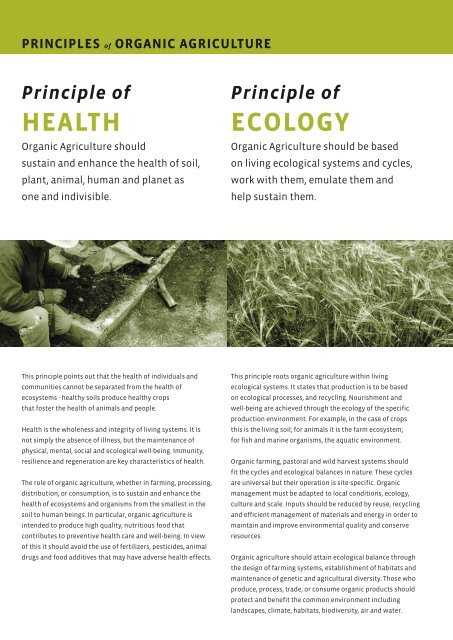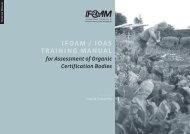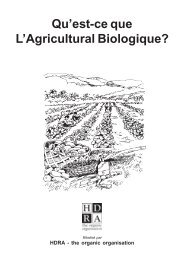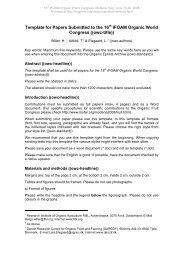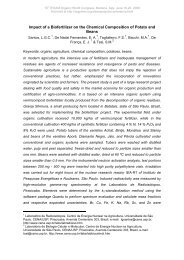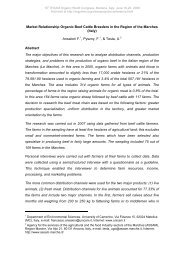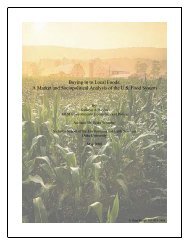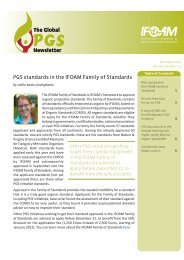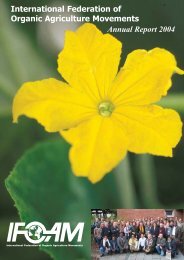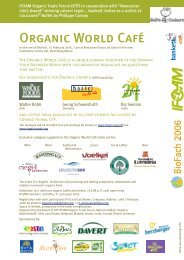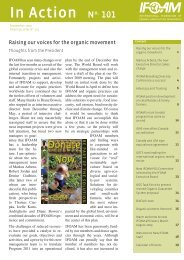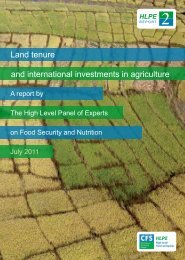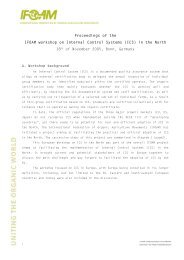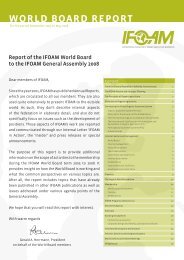PRINCIPLES of ORGANIC AGRICULTURE PREAMBLE - ifoam
PRINCIPLES of ORGANIC AGRICULTURE PREAMBLE - ifoam
PRINCIPLES of ORGANIC AGRICULTURE PREAMBLE - ifoam
You also want an ePaper? Increase the reach of your titles
YUMPU automatically turns print PDFs into web optimized ePapers that Google loves.
<strong>PRINCIPLES</strong> <strong>of</strong> <strong>ORGANIC</strong> <strong>AGRICULTURE</strong><br />
Principle <strong>of</strong> Principle <strong>of</strong><br />
HEALTH ECOLOGY<br />
Organic Agriculture should<br />
sustain and enhance the health <strong>of</strong> soil,<br />
plant, animal, human and planet as<br />
one and indivisible.<br />
This principle points out that the health <strong>of</strong> individuals and<br />
communities cannot be separated from the health <strong>of</strong><br />
ecosystems - healthy soils produce healthy crops<br />
that foster the health <strong>of</strong> animals and people.<br />
Health is the wholeness and integrity <strong>of</strong> living systems. It is<br />
not simply the absence <strong>of</strong> illness, but the maintenance <strong>of</strong><br />
physical, mental, social and ecological well-being. Immunity,<br />
resilience and regeneration are key characteristics <strong>of</strong> health.<br />
The role <strong>of</strong> organic agriculture, whether in farming, processing,<br />
distribution, or consumption, is to sustain and enhance the<br />
health <strong>of</strong> ecosystems and organisms from the smallest in the<br />
soil to human beings. In particular, organic agriculture is<br />
intended to produce high quality, nutritious food that<br />
contributes to preventive health care and well-being. In view<br />
<strong>of</strong> this it should avoid the use <strong>of</strong> fertilizers, pesticides, animal<br />
drugs and food additives that may have adverse health effects.<br />
Organic Agriculture should be based<br />
on living ecological systems and cycles,<br />
work with them, emulate them and<br />
help sustain them.<br />
This principle roots organic agriculture within living<br />
ecological systems. It states that production is to be based<br />
on ecological processes, and recycling. Nourishment and<br />
well-being are achieved through the ecology <strong>of</strong> the specific<br />
production environment. For example, in the case <strong>of</strong> crops<br />
this is the living soil; for animals it is the farm ecosystem;<br />
for fish and marine organisms, the aquatic environment.<br />
Organic farming, pastoral and wild harvest systems should<br />
fit the cycles and ecological balances in nature. These cycles<br />
are universal but their operation is site-specific. Organic<br />
management must be adapted to local conditions, ecology,<br />
culture and scale. Inputs should be reduced by reuse, recycling<br />
and efficient management <strong>of</strong> materials and energy in order to<br />
maintain and improve environmental quality and conserve<br />
resources.<br />
Organic agriculture should attain ecological balance through<br />
the design <strong>of</strong> farming systems, establishment <strong>of</strong> habitats and<br />
maintenance <strong>of</strong> genetic and agricultural diversity. Those who<br />
produce, process, trade, or consume organic products should<br />
protect and benefit the common environment including<br />
landscapes, climate, habitats, biodiversity, air and water.


